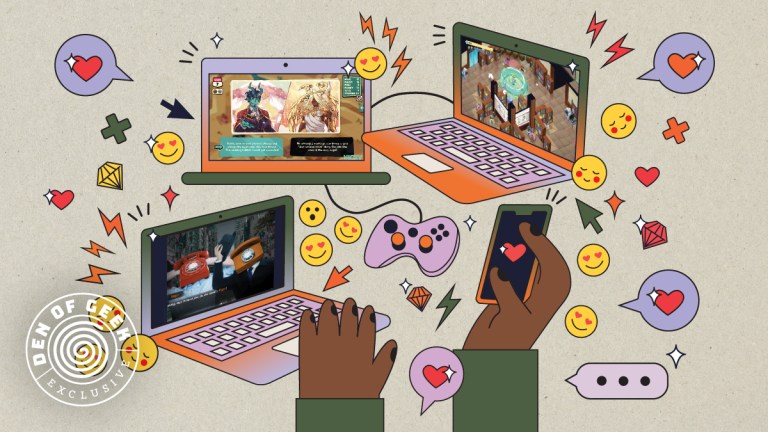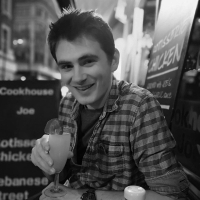Boyfriend Dungeon, Dialtown, and the Dating Simulators That Let You Kiss Inanimate Objects
Dating simulators are evolving, and now video game developers are giving players the chance to date and romance all kinds of supernatural suitors.

This article appears in the new issue of DEN OF GEEK magazine. Get your copy here.
Modern dating is scary, surprising, and oftentimes a bit bizarre. No style of game captures these sentiments better than the aptly named dating simulators, called as such because they let players form romantic relationships with fascinating digital characters (each with their own set personalities, responses, and preferences) in a similar way they would real-life suitors. These games emphasize text-heavy decision-making and dialogue options in favor of action but affecting the outcome of which potential partner you end up with can be just as engaging.
But what happens if human-on-human relationships are suddenly done away with in favor of wooing supernatural candidates? The basic tenants of getting to know potential suitors remain the same, sure, but a breed of supernatural dating sims is on the rise. From Hatoful Boyfriend’s sentient pigeons to the Dead by Daylight serial killers seen in last year’s Hooked on You, no species, object, or monster is seemingly off-limits when it comes to finding love in a video game.
One indie dating simulator wilder than most is Dialtown, a lo-fi genre spin that takes phone dating one step further by letting you date, well, phones with bodies. “I’d always enjoyed object head characters in fiction,” says the game’s sole creator, Direct Dogman, referring to Dialtown’s visuals, which are reminiscent of mashed-up newspaper. “[It] allows for an abnormally diverse range of character portraits, far more than would’ve been feasible with hi-fidelity graphics. I’m no Picasso, but I’m really adequate at shambling literal garbage together into the shape of a datable person. I don’t care if he’s made of garbage. Now, kiss.”
Dialtown follows the typical dating simulator formula of presenting players with a set number of romanceable characters, having them make choices, and selecting different dialogue options to affect the final outcome of the story. In addition to each phone’s specific personality traits, however, it’s the Blackadder-esque humor and the overall surrealist vibe that offers up a zanier dating experience than is traditional. “Dating, and hell, life itself, can be surreal sometimes,” posits Dogman. “Finding unique ways to convey that surrealness can be a great way to set your story apart from [those] that don’t tap into the mundane eccentricities of life.”
Another dating sim unafraid to combine life’s mundanity with an oddball take on love’s pursuit is the aptly-titled Boyfriend Dungeon. Combining the romancing with the gameplay of a conventional top-down dungeon crawler, it’s a refreshing take that quite literally lets you date your weapons, in between all the hack-and-slashing. If you’ve ever looked at a dagger and thought “Phwoar. I’d love to take that to a restaurant and get to know it on an emotional level,” then this is the game for you.
Boyfriend Dungeon caused quite a stir upon release for its portrayal of Eric, a stalker-ish character that ignores your advances in a potential rumination on how dangerous dating can be. “I wasn’t trying to be edgy or tackle any particular issue,” reveals director Tanya X. Short. “I just wanted a well-written antagonist that felt like a real person with real flaws. He also does cartoon villainy (kidnapping, mad doctoring, the usual), but part of a real antagonist is that they make you feel uncomfortable.” Regardless of how far removed from reality a dating sim is, certain players can’t help but be deeply invested. “Some people say defeating him was cathartic, which is a huge compliment.”
For as far-fetched as dating your weapons appears, Short believes there must be familiar elements players can recognize. Otherwise, these usually inanimate objects would be tough to connect with. “Initially, I had planned to make the whole thing happen in a traditional fantasy world, partially to escape the various traumas associated with modern dating,” she says. “But we actually had to move it to be more contemporary for the dating and writing to still be relatable, and it felt like normal date places (cafes, restaurants, gyms) was the best way.”
As well as being informed by the type of weapon they are, the team at Kitfox Games had to think carefully – as any studio making a dating sim should – about how to differentiate between each romanceable character. You don’t want them to appear too similar, and it starts by ensuring a good degree of visual variety. “They shouldn’t look samey,” Short makes clear. “Each should make you think, ‘Ooh, what’s THAT person about?’”. Following this, it’s important that players are never bored by suitors. Luckily, similar to Dialtown, Short ensured this was never the case in Boyfriend Dungeon thanks to some snappy writing. “Respecting the player’s time results in a more memorable experience, so I try to keep things moving at a quick pace.”
Relatability aside, a fear of the fantastical hasn’t prevented Beautiful Glitch’s Monster Prom series from growing. Initially set at a high school where Frankenstein’s monster and werewolf-style figures are all romanceable, 2018’s first game saw you try to find a date before the titular event, but the concept has since expanded—first to a camp in Monster Prom 2 and then a road trip in Monster Prom 3. By constantly changing the setting, the studio has kept this world of fantastical creatures fresh.
“I think non-mundane settings help a lot in elevating a genre that’s all about mundane interactions,” reveals creative director Julian Quijano. Monster Prom differs from other dating sims, though, in that saying the wrong thing may lead down the right path, depending on the suitor’s persona. “I have never been a fan of the main mechanic of dating sims being ‘choose the obvious answer that the character wants to hear.’ It feels uninteresting to me,” he says. “Avoiding the classic approach (as seen in most dating sims) was quite intentional.”
One element shared between all three games discussed, though, is their nature to teach players to expect the unexpected. Because while everyone’s experience of dating in real life is no doubt unique, other types of fiction are chock full of stereotypes such as the jock douchebag character, the nerd with a crush, or the hopelessly in love best friend. You won’t find such tropes in Boyfriend Dungeon or Monster Prom, meanwhile, as the whole point of the dating sims being supernatural is to not be normal. If they are present, it’s usually to make fun of them or to push them past the point of believability.
As formulaic as dating sims can be, leaning into the supernatural and unusual is often a clever way to break the rules, make the most of dating’s mundanity, and be a little bit cheeky. One thing is for certain: quirky genre entries aren’t going away. Not while developers and players alike are having this much fun with them. “Dating sims go from absolutely earnest, corny, and intense to silly, meta, horny, and/or outright kitsch,” sums up Quijano. “This is a genre that many times takes itself not seriously at all. I think it’s part of the appeal.”
